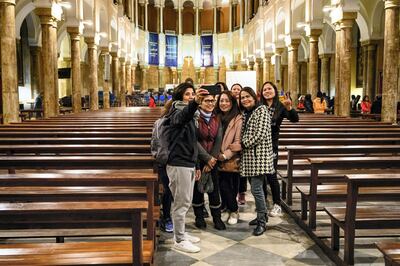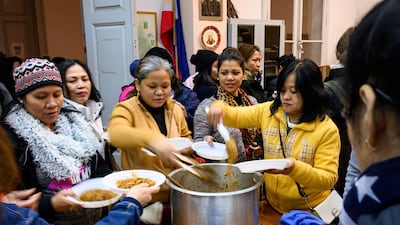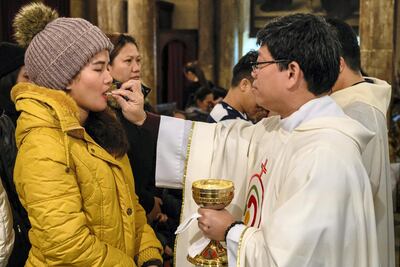Singing in Filipino to the strumming of two guitars, the voice of over a hundred women rose softly in St Joseph’s church in the Lebanese capital, Beirut.
The singing gave in to laughter as the priest, during his homily, told his congregation the story of St Joseph’s annunciation with punchlines that included a quote from American popstar Beyoncé’s song “Listen”.
The Filipino Catholic tradition of Simbang Gabi, or the celebration of an early morning mass for nine consecutive days before Christmas, was revived in Lebanon in 2017 with the arrival of Father Henry Ponce, the first Jesuit Filipino priest to officiate in the small Mediterranean country.
It brings comfort to Filipino women who work as domestic workers in difficult conditions that have recently worsened as Lebanon struggles with its worst economic crisis since the end of the civil war in 1990.
"I did not expect that people would come to church in higher numbers than last year considering the current circumstances," Father Ponce told The National. "But I speak their language. They feel connected."
Since the summer, Lebanon has faced a liquidity and imports shortage. The economic crisis pushed the Lebanese to the streets in protest on October 17, but the political class remains paralysed, with no government since late October.
Migrant workers, including Filipinos, have been hit particularly hard by the crisis.
In addition to losing their jobs or being asked to work part time, it has become increasingly difficult for them to send their salaries to the Philippines.
Most of them are the main breadwinners of their families, sending at least half, if not all, of their income back home.
As Lebanese Pounds are worthless outside of the country, the money transfer has to remain in US dollars despite employers being forced to pay salaries in the local currency since banks restricted access to dollars in early November.
Several Filipino domestic workers said that money transfer companies have imposed a $300 dollar monthly cap, in addition to demanding that fees – between $5 and $10 dollars – be paid in dollars as well.
In parallel, the switch to Lebanese Pounds has caused salaries all over the country to lose around 30 per cent of their value as the price of the dollar has shot up on the black market, where it is traded on average for 2,000 Lebanese Pounds.
The situation is unprecedented since the Lebanese Pound was pegged to the dollar in 1997 at an exchange rate of 1,507.5 Lebanese Pounds to the dollar. The peg is still officially in place.
For many Filipinos, the struggle is not worth it anymore.

Minda Mendez, 38, took advantage of her embassy’s offer earlier this month to cover repatriation costs for its citizens, including the plane ticket and penalties incurred for overstaying their visas.
This was the first time that the embassy made such a move since the 2006 war between Lebanese Iran-backed group Hezbollah and Israel, the Filipino ambassador, Bernaditat Catalia, told The National. She said she expected around 1,500 people to benefit from the programme. A first group of Filipinos should leave before Christmas.
“I feel happy. I can take my first real holiday in 10 years,” said Mrs Mendez, who is set to travel in February 2020, as she shared with dozens of other women a bowl of Filipino noodles and cake at St Joseph Church after Simbang Gabi mass.
Without the embassy’s help, Mrs Mendez would have had to cough up a penalty of $200, which is nearly equivalent to an entire month’s wage, before leaving the country. Her employer did not renew her residency permit last year.
Labour conditions in Lebanon are so poor that the Philippines banned its citizens from working there in 2007, but this did not deter women like Mrs Mendez. Salaries in Lebanon are comparatively higher.
Mrs Mendez arrived in 2009 via Thailand and Bahrain with the help of an illegal recruitment agency in the Philippines which coordinated with another agency in Lebanon.
There are 34,000 Filipinos in Lebanon, the fourth biggest migrant community behind Ethiopians, Bangladeshis and Sri Lankans.
The Filipino embassy is the only one that has set up a free repatriation programme. The Bangladeshi embassy told The National in an email that Lebanon's General Security, which deals with immigration issues, gave permission to its citizens who do not have a valid residency permit to go home after paying a one-year penalty only, or $200.
For Filipino women who have been abused by their employers, free repatriation represents a lifeline.
As she filled out the necessary forms at the Filipino embassy on December 9, Renaline Andres de la Cruz, 36, could barely hide her tears of relief.

When she arrived in 2006, her first employer physically abused her and did not legalise her situation with the Lebanese authorities. After she died, Mrs de la Cruz worked illegally for several years.
“Really, I’m a good person, but my employer left me,” she repeated. “At least now I can rest. My sisters have graduated from college in the Philippines. I will have no more problems and will open a simple business.”
Under Lebanon’s Kafala system, migrant workers do not have labour rights.
“With the crisis, their situation is even worse. They have very little legal recourse if they are not paid or if their wages are reduced and can only change employer twice, which is very difficult because they need their consent,” said Zeina Ammar, advocacy and communications manager at the anti-racism movement, a Lebanese grassroots collective which collaborates with migrant workers.
But going home is not as easy as it sounds. “They have to do a cost benefit analysis. Either go back home where the situation was bad enough to push them to leave in the first place or stay here and suffer from the financial situation which will only get worse,” said Mrs Ammar.
Father Ponce told The National that many Filipinos also feel ashamed to return home empty-handed after having supported their families for years.
“When you start sending dollars, people in the Philippines think you have made a lot of money. But it’s really not that easy, especially for those who have been victimised by human trafficking,” he said.
Some, like Mrs Mendez, are travelling back to the Philippines only to start searching for a job in another country once again.
She needs to continue supporting her parents and her son, now 13 years old. In ten years, she has only seen him in person once. The rest of the time, they speak through Facebook.
As per Filipino tradition, every person that attends the nine masses of the Simbang Gabi can make a wish. When Father Ponce asked Mrs Mendez what she wished for, her answer was simple: “something good for my family.”







